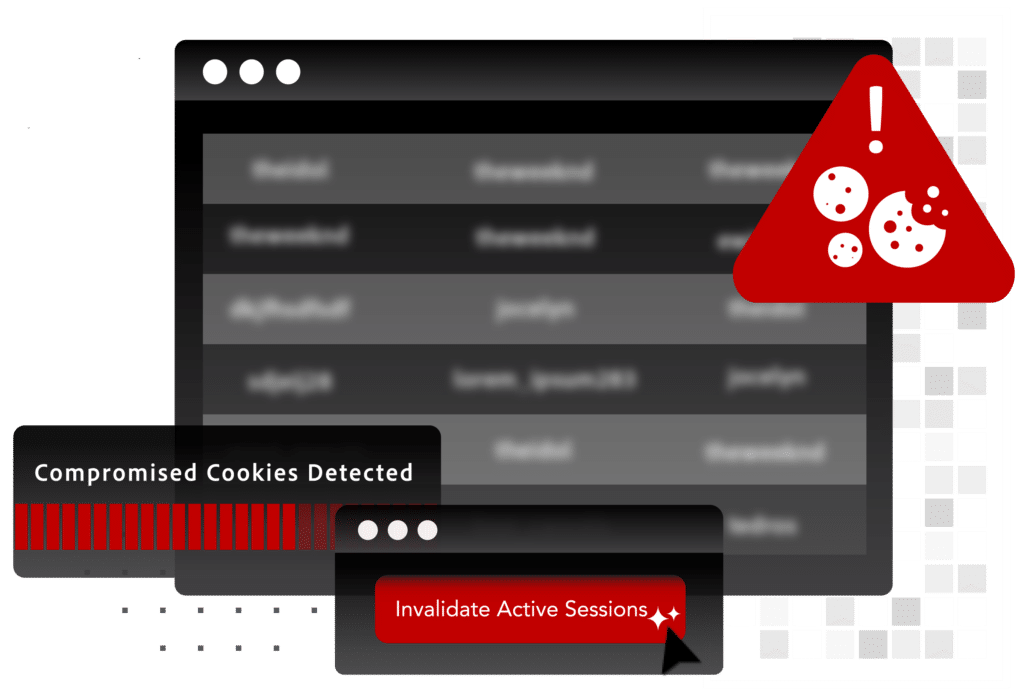Session Hijacking Prevention
A stolen cookie from your enterprise’s single sign-on provider or developer tool can allow bad actors to bypass all forms of authentication – from passwords to MFA and even passkeys – access corporate resources, and identify a malware-infected device’s owner as a potential entry point to your organization.
SpyCloud enables enterprises to take swift action to prevent unauthorized access when cookies from critical workforce services – such as a corporate Okta instance – are stolen from employees’ infected personal or corporate devices.
What criminals don't want you to know...
The next generation of ATO is here, and enterprises not only need to keep up with speed of criminal innovation, but find ways to preemptively prevent it.
Anti-detection tools work
MFA is not enough
Without an attempted login, criminals aren’t prompted with MFA – they are able to bypass authentication entirely and gain access to accounts without setting off red flags
Cookies = credentials
Criminals value active stolen sessions as much, if not more, than credentials – acting with stealth and speed before the session exposures, and often before a user finds out they’re infected
Prevent ATO from compromised web sessions

Once a threat actor has stolen a user’s cookies, they can emulate a legitimate user’s trusted device and browser fingerprint. SpyCloud Session Identity Protection provides early warning of users who are victims of active malware infections to proactively protect them before criminals are able to leverage stolen browser fingerprints to access their accounts.
Prevent ATO & MFA bypass
Defend against criminals exploiting stolen browser sessions to take over consumer or employee accounts and stop targeted attacks where criminals impersonate trusted devices to bypass even the most advanced authentication methods.
Reduce exposure time
Instantly become alerted to compromised cookies as they appear on the darknet and invalidate sessions to stop active threats to your users.
Enriched data, ready for action
SpyCloud’s security teams recapture data on hundreds of thousands of infected users per month – parsing out the compromised cookies relevant to your domains, enriching it with information to help you identify the affected system for remediation delivered via our high-volume, REST-based API.
Scalable remediation options
Operationalize the data to fit with any use case and workflow – choose how and when to intervene to protect exposed accounts by invalidating the compromised cookies or flagging user accounts with known compromised devices for increased scrutiny.
Explore SpyCloud
Enterprise Protection
Reduce your risk of ransomware and other critical attacks – acting on known points of compromise
Learn more
Consumer Risk Protection
Take a proactive approach to combating account takeover and stop high-risk attacks tied to malware
Learn more
Investigations
Efficiently piece together criminals’ digital breadcrumbs to reveal the identities of specific adversaries engaging in cybercrime
Learn more
Data Partnerships
Access comprehensive breach and malware data to add value to security and fraud detection products and services
Learn more
SecOps
Efficiently secure employee identities and safeguard corporate data and critical IP from cyberattacks.
Learn more
Threat intel teams
Investigate and stop threats with insights well beyond raw data and IOCs
Learn more
Cybercrime Analytics
Learn about the new way to disrupt cybercrime with automated analytics that drive action
Learn more
Test our data
We’re confident you’ll get more matches with SpyCloud – let’s do a match rate test
Learn more
Check your exposure
Uncover threats to your organization like malware-infected employees, stolen session cookies, and recency of breach exposures
See your results
Session Hijacking Prevention FAQs
Session hijacking occurs when a user’s web session is taken over by an attacker. When you log into a site or application, the server sets a temporary session cookie in your browser. This lets the application remember that you’re logged in and authenticated. Some cookies may last only 24-48 hours, while others last for months. With a valid stolen cookies and an anti-detect browser that emulates the infected system, a bad actor can perpetrate session hijacking – bypassing the need for a password, passkey, or MFA – without setting off any red flags.
Session hijacking is an increasingly prevalent precursor to fraud, and even more frightening to the enterprise, ransomware attacks.
Infostealer malware is the culprit. The first step is either by deploying malware directly onto a user’s device, or by buying or trading botnet logs on the darknet. Infostealer malware exfiltrates all manner of data from the infected device, including credentials, autofill info, and web session and authentication cookies without the user being aware of the infection. The criminal can then use a stolen session cookie to authenticate as the user – bypassing security and fraud controls including MFA.
Session hijacking is a form of targeted account takeover, and an easy way for criminals to launch a ransomware attack from inside the corporate network or a critical workforce service (including SSO). Once criminals have access to corporate applications, they can easily move laterally throughout the organization disguised as a legitimate user and attempt to escalate privileges in order to access valuable company data.
An employee with poor cyber habits who clicks on a malicious link or downloads a suspicious document and gets infected with an infostealer – aka an unwitting insider threat – is one of the most exploitable entry points for ransomware.
Disrupting cybercrime, one cookie at a time
Read the blog
See the trends
Malware is making its mark on the darknet – our annual report focuses on the growing risk of malware infections.
Connect with us
See how SpyCloud can protect your employees and consumers from session hijacking.
